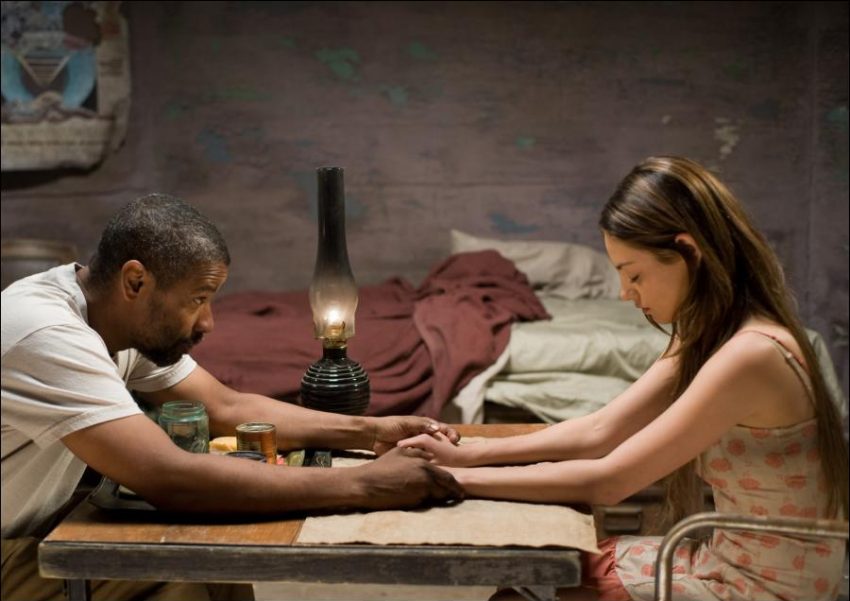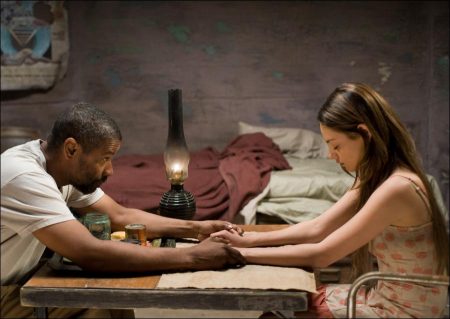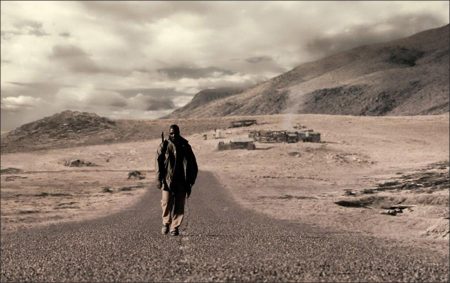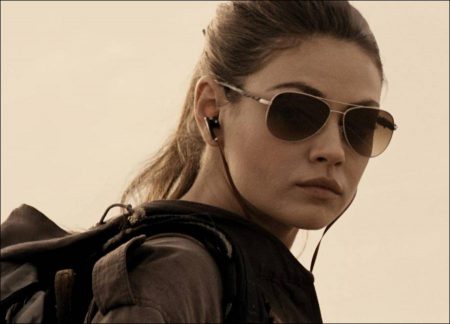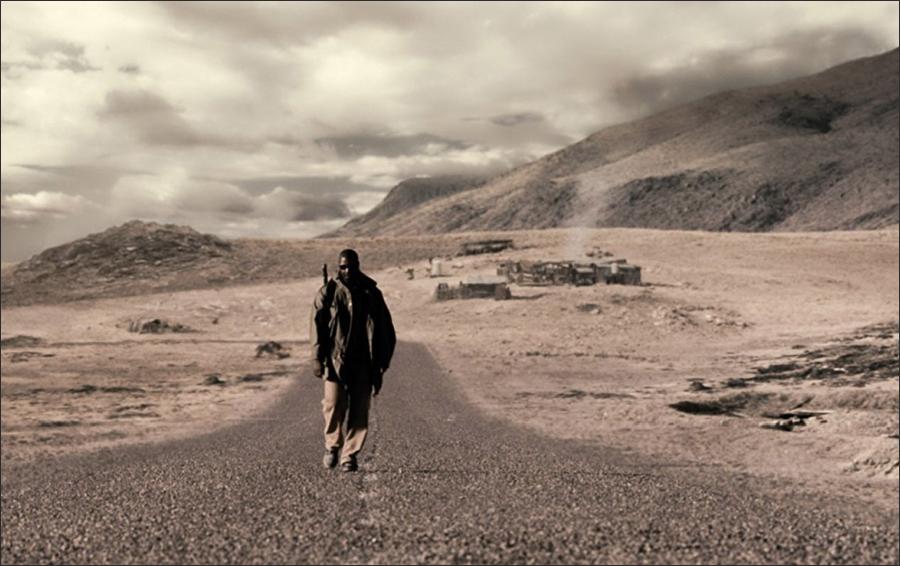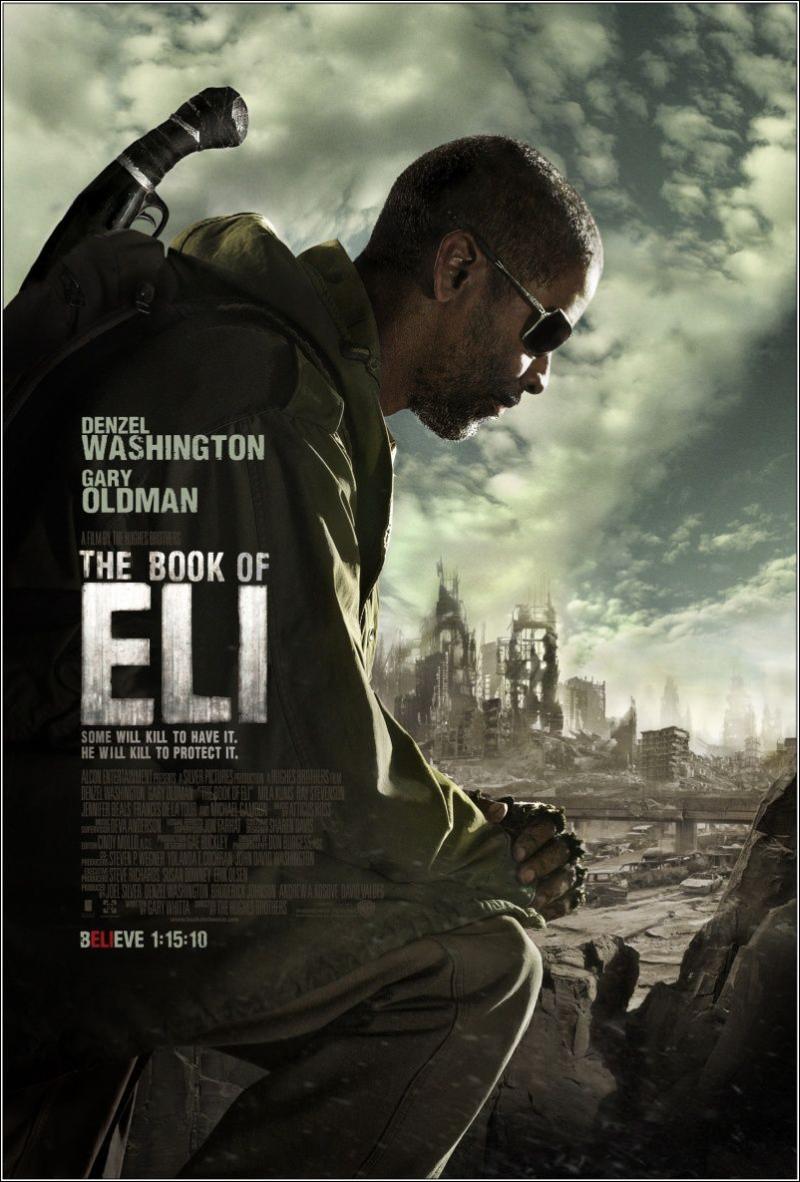All About The Book of Eli
Washington and the Hughes brothers agreed that the actor portraying Carnegie would have to present Eli with a formidable challenge and that led them to Gary Oldman. Says Washington, “Gary’s a champion actor and I wanted to be sparring with the best.”
Albert Hughes also cites Oldman’s “wicked sense of humor,” saying, “He and Denzel injected some levity into tense moments on screen. It’s a serious story, but it’s definitely not bleak and especially not when these two face off.”
“I always appreciate a classic battle,” Johnson attests. “When Denzel Washington confronts an enemy on screen, I know that’s a movie I’m going to enjoy.”
“Carnegie is essentially a dictator,” states Oldman. “He has built this town through violence and through control of a very valuable commodity-fresh water-because he remembers where to find it. But he’s also smart. He has a philosophy. Carnegie is familiar with the book Eli carries and he’s aware of what it can achieve because it’s a part of his childhood. He’s been looking for it himself for years. These two men have the same obsession over book, though one is coming from a good place and one from a darker place.”
An essential question raised by the story is what contributes to building a civilization. As much as Eli believes the Bible will serve as the basis for a new, just and equitable society, a chance to start over and avoid the errors of the past, Carnegie sees the same text as a means to controlling people and expanding his dominion. The two might agree on the inherent power of the words between the covers of this book but have diametrically disparate views on how that power should be used.
Carnegie has no qualms about eliminating Eli, yet at the same time, he can’t help being intrigued by this extraordinary man who dares oppose him, unlike the uneducated thugs in his employ or the damaged souls who roam the landscape. It’s as if he has finally found a worthy adversary and must savor the moment. “Eli has a powerful presence. He’s steady, resolute and composed,” adds Oldman. “Carnegie has never seen anyone quite like him.”
Says Washington, “Eli won’t capitulate and Carnegie won’t take no for an answer. Carnegie challenges him on every level. It becomes a great battle of wills.”
It also becomes a battle of heavy artillery as Carnegie launches an all-out assault on the man he derisively calls “the walker.”
Their conflict plays out against the ongoing and immediate issues of survival that affect everyone around them, and is another of the themes the film explores. Screenwriter Gary Whitta once attended a practical two-day survival course in which he learned some stark truths that served to inspire some of the onscreen action. “The first thing you learn is that it’s not pleasant. You may have to eat something or drink something you would ordinarily never consider, but the bottom line is that you’ll do what you have to do to stay alive and that comes from basic human nature.”
“When people regress to a primitive level, true character emerges and every conflict is more dramatic,” observes Allen Hughes. “The simplest exchanges are potentially life-or-death.” “I don’t plan on staying. I got someplace I need to be.”
Despite Eli’s singular goal, Washington believes that part of his journey involves lessons he’s not yet aware he needs to learn. “When Eli crosses through Carnegie’s town, he becomes the focus of some unwelcome attention-not only from Carnegie, who wants to destroy him, but from Carnegie’s stepdaughter, Solara, an innocent who reminds him that being human means dealing with other human beings. In his desire to protect the book he thinks of nothing else, but part of his responsibility might also be to open himself up, to really give and do more for others. He’s been entrusted with carrying the book but he must also remember to carry its message. It could be the final test of his particular mission and he is very reluctant to take it on.”
Carnegie’s household includes his blind common-law wife, Claudia, and her daughter, Solara, both of whom he rescued from the badlands years ago and continues to protect-though that benevolence is often tainted by his own self-interest.
Mila Kunis, who stars as Solara, points out, “Carnegie keeps them safe, but they are virtually slaves for it. Solara is a smart girl, a young, strong spirit. She believes there is more to life than this town, but it’s not until she meets Eli that she is inspired to escape. Solara is fascinated and drawn to him. She wants to learn from him, follow him wherever he’s going and explore the rest of the world.”
The filmmakers recognized in Kunis the ability to convey vulnerability mixed with boldness and optimism, all of which define Solara as she ventures into a realm she has long been denied. “Mila is a firecracker,” says Albert Hughes. “She plays Solara in a way that lets you watch her grow, and she grows up fast once outside of Carnegie’s control.”
Together, the two women endure Carnegie’s tempers and ill-treatment for each others’ sake. Beals explains, “Claudia lives for her daughter. Through her relationship with Carnegie she is able to provide Solara with food and clothes and some of the amenities that are completely impossible for other people to get. If Carnegie is the king of this place he has created, then Claudia is its powerless queen.”
Albert Hughes credits Beals with “playing all their tortured history in her face. There’s not a lot of dialogue so she communicates a lot through her body language and her expressions.”
Like Solara, Claudia too has a strong reaction to Eli’s arrival. “He is the first person aside from Solara who shows Claudia unmitigated kindness, and it reminds her of what civilization used to be and how people were once capable of behaving,” says Beals. “It’s a sliver of hope and it gives her strength. The fact that Eli stands up to Carnegie is thrilling for her because it’s something she would love to do but can’t.”
The Book of Eli (2010)
Directed by: Allen Hughes, Albert Hughes
Starring: Denzel Washington, Gary Oldman, Mila Kunis, Frances de la Tour, Ray Stevenson, Jennifer Beals, Karin Silvestri, Michael Gambon, Chris Browning, Keith Splinter Davis, Lateef Crowder
Screenplay by: Gary Whitta, Anthony Peckham
Production Design by: Gae S. Buckley
Cinematography by: Don Burgess
Film Editing by: Cindy Mollo
Costume Design by: Sharen Davis
Set Decoration by: Patrick Cassidy
Art Direction by: Christopher Burian-Mohr
Music by: Atticus Ross, Leopold Ross, Claudia Sarne
MPAA Rating: R for some brutal violence and language
Distributed by: Warner Bros. Pictures
Release Date: January 15, 2010
